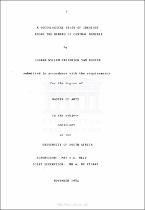| dc.contributor.advisor | Welz, S.E | |
| dc.contributor.advisor | Du Pisanti, S.E | |
| dc.contributor.author | van Rooyen, Johann Willem Friedrich | |
| dc.date.accessioned | 2023-05-11T13:51:06Z | |
| dc.date.available | 2023-05-11T13:51:06Z | |
| dc.date.issued | 1984 | |
| dc.identifier.uri | http://hdl.handle.net/11394/9935 | |
| dc.description | Masters of Art | en_US |
| dc.description.abstract | The concept of ideology: as portrayed in the works of various social theorists, is comprised of a wider Yet related,
range of meanings and connotations. Despite its lack of semantic precision, the concept is of value for sociological
analysis and is of special relevance in the theories of Marx and Weber, both on a descriptive as well as explanatory
level.
In an attempt to test these two theorists I postulates in a substantive setting, the chief ideological and material influences which have affected the socio-culturaI development of the Herero of central Namibia are surveyed and related to some modern social structures peculiar to them.
The study indicates that ideological and material factors have indeed both variously been responsible for significant
social adaptations that have occurred in Herero society in recent times. The findings suggest that material impulses have far outweighed ideological stimuli in importance for the greater part of recorded Herero history. It is only since the end of World War II that ideological variables seem to have predominated as causal agents of social change. | en_US |
| dc.language.iso | en | en_US |
| dc.publisher | University of the Western Cape | en_US |
| dc.subject | Ideology | en_US |
| dc.subject | Herero of Central America | en_US |
| dc.subject | Herero society | en_US |
| dc.subject | Marx and the concept of ideology | en_US |
| dc.subject | Weber and the concept of ideology | en_US |
| dc.title | A sociological study of ideology among the Herero of central Namibia | en_US |
| dc.rights.holder | University of the Western Cape | en_US |

